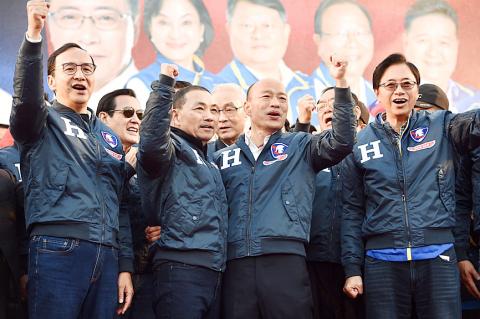Kaohsiung Mayor Han Kuo-yu (韓國瑜) yesterday said that Southeast Asian nations are “no longer taking Taiwan seriously” due to its diplomatic challenges and poor economy, and urged voters to support the Chinese Nationalist Party (KMT) to prevent the nation’s “downfall.”
Commenting on a Thai visa rule change that requires Taiwanese applicants to provide a financial statement, the KMT presidential candidate said the move suggests that Taiwan is losing status in the eyes of other countries.
The Thailand Trade and Economic Office in Taipei in a statement on Monday last week said that the new rule also applies to British, Chinese and French passport holders, and would be extended to more nations.

Photo: Peter Lo, Taipei Times
“They look down on us,” Han said at a rally in Taipei. “Southeast Asian countries are no longer taking Taiwan seriously because of its poor economic performance, diplomatic difficulties and domestic problems.”
Although the Thai government has since postponed the implementation of the rule, it should be taken as a sign that Taiwan is “quickly going downhill,” Han said.
The Jan. 11 elections present a life-or-death choice for the Republic of China, he said, adding that the nation would face four years of “misery” if President Tsai Ing-wen (蔡英文) of the Democratic Progressive Party is re-elected.
At a separate rally in Taipei, Han reiterated that neighboring nations no longer consider Taiwan as deserving of their attention.
With the Economic Cooperation Framework Agreement (ECFA) expected to expire next year and Taiwan’s entry into the Regional Comprehensive Economic Partnership (RCEP) seeming unlikely, the nation’s future is shrouded in uncertainty, he said.
His wife, Lee Chia-fen (李佳芬), has met with their overseas supporters in Malaysia and Indonesia who told her “in tears” that they were saddened to see Taiwan decline, Han said.
“The world is forgetting Taiwan and Taiwan is forgetting the world,” he said.
Taiwanese TV channels do not broadcast world news, only political talk shows, as they are cheaper to produce and commentators “simply say what they want based on their political leaning,” Han said.
If elected, he would promote English-language education at elementary schools and launch a program to send university students abroad for a year using government funds.
While the program is estimated to cost NT$40 billion to NT$50 billion (US$1.3 billion to US$1.6 billion), Han said he expects the actual cost to be lower, because “entrepreneurs could be deeply moved by the policy and donate” to it.
He would also provide scholarships for 1 percent, or about 3,500, of government employees to study abroad.
The policy would include military personnel, public-school teachers, police, firefighters and public servants aged 45 or younger, Han said, adding that if the program is successful, the quota would be doubled the following year.
“This plan would guarantee that Taiwan becomes completely different in 10 years,” he said, adding that he aims to improve the nation’s economy and “revive its lost glory.”

CHAOS: Iranians took to the streets playing celebratory music after reports of Khamenei’s death on Saturday, while mourners also gathered in Tehran yesterday Iranian Supreme Leader Ayatollah Ali Khamenei was killed in a major attack on Iran launched by Israel and the US, throwing the future of the Islamic republic into doubt and raising the risk of regional instability. Iranian state television and the state-run IRNA news agency announced the 86-year-old’s death early yesterday. US President Donald Trump said it gave Iranians their “greatest chance” to “take back” their country. The announcements came after a joint US and Israeli aerial bombardment that targeted Iranian military and governmental sites. Trump said the “heavy and pinpoint bombing” would continue through the week or as long

TRUST: The KMT said it respected the US’ timing and considerations, and hoped it would continue to honor its commitments to helping Taiwan bolster its defenses and deterrence US President Donald Trump is delaying a multibillion-dollar arms sale to Taiwan to ensure his visit to Beijing is successful, a New York Times report said. The weapons sales package has stalled in the US Department of State, the report said, citing US officials it did not identify. The White House has told agencies not to push forward ahead of Trump’s meeting with Chinese President Xi Jinping (習近平), it said. The two last month held a phone call to discuss trade and geopolitical flashpoints ahead of the summit. Xi raised the Taiwan issue and urged the US to handle arms sales to

State-run CPC Corp, Taiwan (CPC, 台灣中油) yesterday said that it had confirmed on Saturday night with its liquefied natural gas (LNG) and crude oil suppliers that shipments are proceeding as scheduled and that domestic supplies remain unaffected. The CPC yesterday announced the gasoline and diesel prices will rise by NT$0.2 and NT$0.4 per liter, respectively, starting Monday, citing Middle East tensions and blizzards in the eastern United States. CPC also iterated it has been reducing the proportion of crude oil imports from the Middle East and diversifying its supply sources in the past few years in response to geopolitical risks, expanding

Pro-democracy media tycoon Jimmy Lai’s (黎智英) fraud conviction and prison sentence were yesterday overturned by a Hong Kong court, in a surprise legal decision that comes soon after Lai was jailed for 20 years on a separate national security charge. Judges Jeremy Poon (潘兆初), Anthea Pang (彭寶琴) and Derek Pang (彭偉昌) said in the judgement that they allowed the appeal from Lai, and another defendant in the case, to proceed, as a lower court judge had “erred.” “The Court of Appeal gave them leave to appeal against their conviction, allowed their appeals, quashed the convictions and set aside the sentences,” the judges